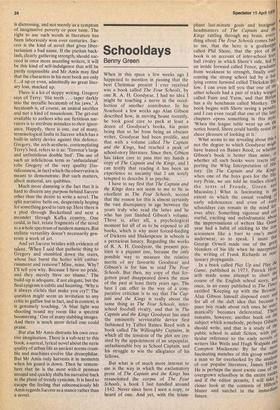Schooldays
Benny Green
When in this space a few weeks ago I happened to mention in Passing that the best Christmas present I ever received was a book called The Four Schools, by one R. A. H. Goodyear, I had no idea I might be touching a nerve in the recol lection of another contributor. In his Notebook a few weeks ago Alan Gibson described how, in moving house recently, he took good care to pack at least a dozen of Goodyear's books, his point being that so far from being an obscure writer, Goodyear had been prolific, and that with a volume called The Captain and the Kings, had reached a peak of school-story literature. Since then, Gibson has taken care to pass into my hands a copy of The Captain and the Kings, and I can testify that reading it has been an experience so uncanny that I am sorely tempted to describe it as psychic.
I have to say first that The Captain and the Kings does not seem to me to be as excellent as The Four Schools, second that the reason for this is almost certainly the vast discrepancy in age between the yours truly who read the latter and he who has just finished Gibson's volume. There is, after all, a psychological moment for all of us to be exposed to all books, which is why most forced-feeding of Dickens and Shakespeare in schools is a pernicious lunacy. Regarding the works of R. A. H. Goodyear, the present position is a piquant one, because the only possible way to measure the relative merits of my favourite Goodyear and Gibson's is for him to read The Four Schools. But then, my copy of that forgotten pearl disappeared down the maw of the past at least thirty years ago. The best I can offer in the way of a comparative criticism is to say that The Captain and the Kings is really about the same thing as The Four Schools, interschool football rivalry, and that in The Captain and the Kings Goodyear has used the eminently serviceable device first fashioned by Talbot Baines Reed with a book called The Willoughby Captains, in which all the tensions of the plot are created by the appointment of an unpopular, unfashionable boy as School Captain, and his struggle to win the allegiance of his fellows.
But what is of much more interest to me is the way in which the exclamatory prose of The Captain and the Kings has resuscitated the corpse of The Four Schools, a book I last handled around 1942. Never since have I seen a copy, or heard of one. And yet, with the trium
phant last-minute goals and benignani headmasters of The Captain and Olt Kings rattling through my brain, eve*: thing about The Four Schools comes bat" to me, that the hero is a goalkeeper I
called Phil Shore, that the plot of the book is an account of inter-school fool' ball rivalry in which Shore's side, led hf an inside forward called Fence, graduate from weakness to strength, finally over' coming the strong school led by a bur lying centre forward called Thickskin low. I can even tell you that one of the other schools had a pair of tricky winge°
called Fairs and Yarm, and that Birlcoe has a sly henchman called Monkey. The book begins with Shore saving a penal* and I can even recall that one of the later chapters opens something in this style: `When the league table went up on tilt notice board, Shore could hardly resist the sheer pleasure of looking at it.' What seems to me revealing about this is not the degree to which Goodyear might have leaned on Baines Reed, or whether Gibson's book is better than mine, 0 whether all such books were tracts soil' porting the Whig Interpretation of flis' tory. (In The Captain and the Kings' when one of the boys goes for the tory Prize, we are told he studies closeld the texts of Froude, Green ari„ Macaulay.) What is fascinating is extent to which the casual reading °,' early adolescence and even of cell' schooldays can remain in the mind Nr: ever after. Something vigorous and 01, ourful, exciting and melodramatic aboil,' the improvisations of writers like G000' year had a habit of sticking to the coo' sciousness like a burr to one's tors: underwear, so to speak. I insist that George Orwell made one of the gre°d blunders of his life when he interpret° the writing of Frank Richards as rea°' tionary propaganda. In a book called Play Up and Play lig Game, published in 1973, Patrick fleivi' arth made some attempt to chart thed course of the English school story, 811, once, in an essay published in The Tinle; entitled 'Keeping up with the Browas Alan Gibson himself disposed once an' for all of the daft idea that because a poor boy reads about rich ones he airt°; matically becomes deferential. The,l'e remains, however, another book on subject which somebody, perhaps Gibsa°' should write, and that is a study of Ole public school in adult fiction, with Pari ticular reference to the early novels °A writers like Wells and Hugh Walpole alivt Compton Mackenzie: By far the 10.55 fascinating member of this group reMairits a man so far overlooked by the analYs of our popular literature, James Hilgst.lte. He is perhaps the most exotic case of r°,, overgrown schoolboy in the entire rani°. and if the editor permits, I will take : closer look at the contents of Hilton; blazer and satchel in the immediat future.


































 Previous page
Previous page